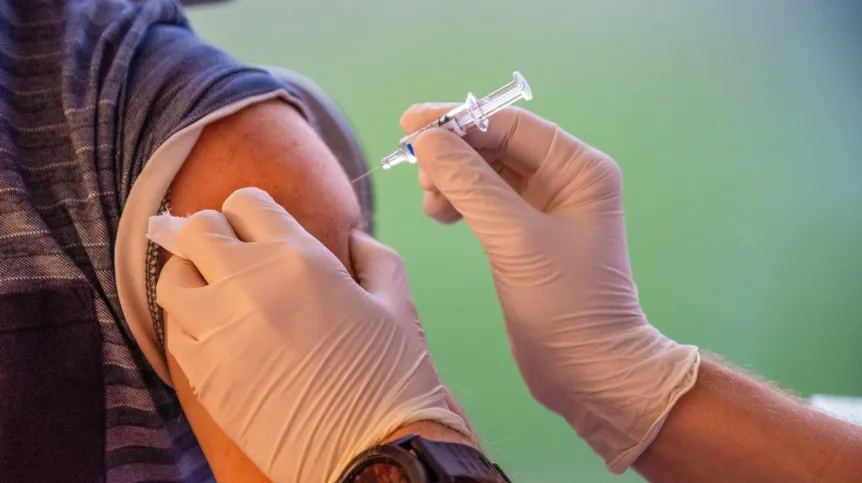
Adult vaccination programmes return 19 times their investment, and vaccinations against pneumococci, bacteria that cause pneumonia, return 33 times their investment, experts say. The risk of pneumococcal infection increases in the autumn-winter season, they add.
'Until recently, pneumococcal infections were associated mainly with children's diseases, but the progressive aging process of our society has changed this dramatically. The highest number of cases of pneumococcal pneumonia is now observed among the elderly, which is associated with frequent hospitalisations and an increase in healthcare costs in Poland', infectious disease expert Professor Ernest Kuchar, head of the Paediatric Clinic with the Observation Department of the Medical University of Warsaw says.
The National Institute of Public Health, National Institute of Hygiene - National Research Institute reports that pneumonia is the cause of approximately 50 percent of hospitalisations due to respiratory diseases in adults in Poland. It is most often caused by pneumococci, Streptococcus pneumoniae bacteria.
Pneumococci are transmitted through droplets, which increases the risk of their rapid spread, especially in the autumn and winter period, when the body's immunity is weakened. They can also lead to the development of invasive pneumococcal disease (meningitis or sepsis).
For people over 65 years of age and for patients with chronic diseases - such as diabetes, heart disease or chronic obstructive pulmonary disease (COPD) - pneumococcal infection is extremely dangerous. In these groups, pneumonia can be severe, it can lead to health complications, and often to death.
Data from the Global Burden of Disease Study show that as many as one in 25 deaths among adults over the age of 55 can be attributed to lower respiratory tract infections – including pneumococcal pneumonia, influenza, and RSV.
'Pneumonia is a very serious disease that can weaken and confine even young and healthy people to bed for weeks, one that is particularly dangerous for senior citizens. If the infection is caused by pneumococci, the disease develops rapidly and can pose a serious threat to life', says Joanna Bogdanowicz-Antos, president of the Healthy Progress Foundation.
She adds that pneumococcal pneumonia prevention through vaccination is considered one of the most effective tools for protecting public health: it not only helps prevent the disease and its complications, but also brings savings to the healthcare system.
According to the latest data from the independent research organization in the field of health economics - OHE (Office of Health Economics), adult vaccination programs return up to 19 times their initial investment, and in the case of the pneumococcal vaccine, this return is up to 33 times the investment value. This is the highest return compared to vaccinations against influenza, RSV virus and shingles.
The return on investment in vaccination translates not only into lower morbidity and mortality due to a given infectious disease, but also to the healthcare system, because the funds saved thanks to vaccination can be allocated to other needs.
In the long term, investment in vaccination of the elderly also means a lower risk of convalescence, exacerbation of the course of co-morbidities, and less need for care for geriatric patients.
'I am convinced that when it comes to lower respiratory tract infections in the adult population, it is time for a paradigm shift from expensive treatment of their dangerous consequences to a focus on prevention and investment in vaccination of adults. This will also have an impact on other therapeutic areas, including cardiology, as cardiovascular diseases are the most common cause of mortality in the world, and at the same time, cardiac patients are a risk group for pneumococcal pneumonia', says Professor Ernest Kuchar.
He adds that one important meta-analysis shows that vaccinations against pneumococci are associated with a decrease in mortality due to cardiovascular diseases and myocardial infarction. 'This proves that prevention is the foundation of the stability of our healthcare system, which is currently facing a shortage of resources and the need for savings in all areas', he adds.
According to Bogdanowicz-Antos, adult vaccination programmes are a powerful tool to alleviate the pressure exerted on the healthcare system by the aging population. 'I would like us to work on changing the attitude to a more prevention-oriented one. This way of thinking means that the healthcare system gains more resources for treating other, unpredictable health challenges that cannot be prevented as easily as pneumococcal pneumonia', she says.
According to the National Institute of Hygiene, a 13-valent pneumococcal vaccine has been included on the list of reimbursed drugs since September 1, 2023. It is free of charge for patients aged 65 and older from pneumococcal disease risk groups. (PAP)
jjj/ bar/ mhr/ kap/
tr. RL













